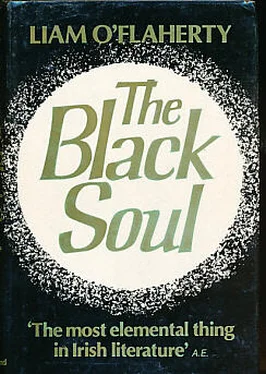He saw in front of him the narrow ledge of grey limestone, shining with moisture, as slippery as a glass floor. A fossil stuck up from a boss on the ledge just at the curve. It showed yellowishly through the mist. And above, the cliff towered with such tremendous strength that without touching it he felt its contact, thrusting him outwards. And he looked from it to the sea, that murmured fiercely beneath; he could see lines of white foam through the mist crawling about like snakes. For a moment the horror of the danger that lay in front of him, crossing that ledge, almost petrified him, just as that little yellowish figure on the ledge had been petrified. He shuddered. But his mind was firmly set on going across the ledge. He did not know why he was going across. As he took off his shoes he remembered that Red John was a very miserable fellow, utterly worthless, that his death was a matter of absolutely no importance to the world, and that he himself in cold reason was in no palpable way responsible for that death. Then why go across that ledge, to almost certain death, in a foolish attempt to save an idiotic yokel who was better dead than alive?
As he put his trousers inside his socks, lest the ends might catch in a spur of the cliff, he recalled the obvious fact that even if he were responsible for Red John’s death and even if Red John were a genius and of importance to society, his death would be of no consequence, since nothing in the universe mattered but life itself, purposeless motion. It was perfectly futile to save life. It would not even be saving life. One might as well talk of saving death. Death was just as positive, more positive in fact, than life. Ha! But then death in each case was just as positive. It was as positive in his own case as in the case of Red John. Ah! but why seek it? Why seek anything? What was the use of any effort?
He finished arranging his trousers and stood up, looking in front of him at the ledge. Then through the intricate maze of his reasoning his mind again grasped in horror the reality of his position. He cast a fleeting glance at the peasants behind and he saw only the figure of Little Mary huddled on the boulder, afraid to look up, dumb and spellbound with the accumulation of horror, until even the news that her lover was going to cross the ledge only touched her brain as a needle pricks a limb that is frozen. In the moment that his eyes swept back to her and then forward to the ledge, he took in every single detail of her figure, as if his brain were lashed by terror to a speed equal to that of light. She was leaning on her right hand against a boulder. Her dark hair strayed down over her left cheek, that was towards him. He could see by the straining of her white bare throat that her eyes were shut. And her body was indistinct under the outline of her heavy cashmere shawl, as if she had crumbled up, struck by sorrow. His love for her made him so dizzy that he was unable to obey the impulse to fly back to her until it had passed, exhausted by its own force, and he was reasoning again.
He moved a step forward, gripping the slippery rock carefully with his toes. Going back would mean losing his self-respect. There was no reason for going ahead, but to go back would mean a return to his rudderless floating in a sea of ridiculous theories about life. Instinct urged him forward. Why? It was neither because of honour, morals, principles, religion, or sense of duty. It was merely instinct that said, ‘Go ahead and you will feel clean. Go back and you will have to keep arguing all your life in order to prove that you are not dirty.’ He took three steps in rapid succession and then swayed slightly as his right foot skidded three inches and he grasped the face of the cliff with both hands. His heart began to beat audibly, although his breath was coming regularly. Still he moved forward towards the curve.
The ledge grew narrower. He could no longer put forward his left leg that was nearest to the cliff. He had to grip the cliff and shuffle forward with his right leg in front. His spine seemed to be melting. He was afraid to look down at the sea. He shut his eyes and stood still. Suddenly the thought struck him that Red John was waiting around the curve with a knife to kill him, even if he succeeded in escaping the fall to death. Before his closed eyes the knife appeared menacing and he was unable to escape. He opened his eyes to see whether it really was there and he saw nothing but the protruding belt of slate, swelling like a black ulcer from the cliff in front of him. Fear ate at his bowels, giving him the feeling that he had not eaten for a week. ‘I had better turn back,’ he muttered aloud. But he made no attempt to move backwards. In fact he leaned jauntily against the cliff and took out his handkerchief to wipe his forehead, as if he were quite at his ease. And as he wiped his forehead he thought that there was no chance whatever of saving Red John and that he was bound to go back to Little Mary, as a point of honour. But just then he heard a peasant shout, ‘Ah, God of the thousand battles, what a brave man!’ ‘Yes, I am a brave man,’ he murmured, crumbling the handkerchief in a ball. He grasped the cliff again to move forward.
Stupefied with fear he lurched around the curve carelessly in three strides, that made the cliff and the sea turn a somersault three times before his eyes. He scraped his left ankle to the bone. He gashed his left temple. As he was drawing his right leg up after the third stride, it tripped over a boss of the rock and he hurtled forward, stumbling along the brink of the cliff between the earth and sea, like a willow rod blown by a sudden squall. And then as if by magic he righted himself and walked calmly on to a broad plateau, that stretched eastwards, a triangular notch cut midway into the cliff. ‘Safe,’ he sighed breathlessly.
He sat down on the plateau exhausted and content at having performed a feat of such daring. But in a moment he remembered Red John and he jumped to his feet again. He had come to save Red John. He looked about him. Red John was nowhere to be seen. ‘I hope he is dead,’ he murmured. Voices reached him from the summit of the cliff overhead. Peasants had run up the slope from the shore and were now gesticulating above the plateau, pointing to three large boulders that leaned against the cliff at the eastern edge of the plateau, just where the plateau sank into the cliff. ‘Ha!’ he muttered, ‘there’s where he is waiting for me with his knife.’ He wanted to raise his hands and ask them to take him away. But he was ashamed to do so in spite of his fear. They looked upon him as a brave man. He must keep up the pretence. ‘What difference does it make if I get killed by Red John? People would look upon me as a hero. Eh? And I’ll have to die some day. Everybody dies. Don’t they?’ He began to walk towards the boulders mechanically, but his efforts at stoicism did not prevent his body from trembling and smarting. Every muscle was uttering an inarticulate whine of terror. His limbs, although thrust forward by his will, moved with the ponderous slowness of an immense engine making its first hesitating revolution. Though his will tried to force his legs to move quickly, like the legs of a determined courageous man, the legs pretended to be exhausted with weariness. It seemed that the knee-cap of the right leg had jumped off and that blood was gushing from the wound, but when he grasped the knee he found it was a delusion. The knee was perfectly fit. But although he knew it was perfectly fit, he let it go limp and dragged it after him. That gave him a plausible excuse for going slowly. And the slower he went the more the folly of his action grew before his mind. The fear of death grew greater. He doubted the reality of his environment. He thought that Red John and the peasants on the cliff-top were a delusion and that he himself was going to commit suicide, impelled by the consciousness of a monstrous crime. He had a fleeting vision of things like a cliff pressing into his forehead so close to his eyes that the atoms in its face appeared as big as universes. But while his mind conjured with these delusions, his body, his desire to live, were grappling with realities. He had dropped on his belly and was crawling sideways up to the mouth of the cavern between the boulders, in order to see inside it without being seen. And when his right shoulder brushed against the slimy black boulder and he saw the dim interior of the cavern through a corner of his left eye, his senses became so acute that his trembling fear left him and he experienced the kind of morbid enthusiasm and coolness that the soldier feels when he is about to draw the trigger from a concealed position on an advancing enemy. ‘Red John, Red John,’ he called out loudly, ‘what the hell are you hiding in there for? It’s only the Stranger out here, who has come to save you. Come out, man, and don’t be making a fool of yourself. Nobody has got anything against you. Come out.’
Читать дальше












